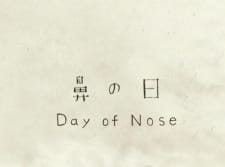Jun 5, 2022
Kind of an absurd take on the drudgery of being a salaryman told in a non-narrative, experimental short format—there's no dialogue at all, and the visual storytelling is not clearcut. The plain characters shuffle from chair to chair in very repetitive scenes, making their way to the nose inspector, who appears to be a manager, assessing the endowment (I guess having a big nose means big success!) by squeezing each nose on each slouched-over worker in a tedious, cyclical process.
The direction is pretty effective: even though this is very repetitive, the tight closeups are packed with humorous expressions, sound effects, and motions. The scenes are
...
open enough to interpretation and sans handholding that it's not always immediately obvious what one is to take away from the imagery. At the same time, it's just structured and thematically obvious enough that we can pretty much remain on the same page, just deviating on a few small details.
The art is crude but kind of charming, and the sound is minimalistic but effective and never squandered. Not only are some of the details humorous, but the whole thing is sprinkled with visual humor, and I'm not sure if most will appreciate the absurdity of the whole thing, which is the main source of humor. It also helps if one can appreciate a more mundane style of conceptual and visual surrealism, and not just the whacked-out Salvador Dali or Max Ernst school of surrealism.
Okay, I guess I'll take the boring interpreter role now:
There seems to be a work-related meaning to the nose-squeezing, whereas the nose-rubbing action, which is often accompanied by head rubbing, is more comfort based—or can even be seen as brown-nosing, perhaps. An old man is shown rubbing the head of a young version of the main character, signaling either affection or approval. The main rubs his nose on the fleece of sheep, and there's obviously some symbolism pertaining to a sheep being a herd animal.
In the most surreal sequence, the main character rolls down a long line of identical-looking supine elderly men, having his head rubbed and rubbing his nose into their chest. It's kind of creepy and weird, but it does give the vibe of climbing a corporate ladder (though he's rolling down a hill). These actions could be seen as reciprocal behaviors that are part of work. The main does what is needed of him and brown-noses, and he is patted on the head for being a good boy.
Most of the salarymen lose their hair, and they become just like this long string of elderly men who are in more senior positions. There's the passing of the torch by the nose inspector to the main character in a hilarious and unexpected sequence and switcheroo.
There's some other weird stuff involving what looks like an occult ritual with animals—I think a chicken and a goat—and naked humans revolving in a circle around a sculpted nose (it's kind of oddly shaped, but I guess that must be what it is). A western perspective will probably lean towards Satanism or something, but Japan is not a highly Christian country, and I think there are probably more apt connotations similar to what you would find with the sheep—a comparison and conflation with the salarymen being no different than barn animals that live to do the bidding of the herdsman.
Oh, and what artistic short would be complete without a scene unsubtly suggestive of the womb? Of course, I don't believe it has to do with rebirth, but rather a retreat, then being thrust back into the daily grind.
Well, your guess is as good as mine. Like a poem, most will interpret certain lines differently if the meaning isn't absolutely explicit. I can definitely see why the rating for most of Wada's shorts is not very high. These are obtuse and have simplistic art. They can be a bit boring if you're solely looking for narrative storytelling and don't appreciate visual poetry—that may sound "pretentious," but I simply mean that it's abstract and interpretive like poetry often is, and it is purely visual, without dialogue. Of course, even for those who can appreciate such a style, they might be underwhelmed by the quaintness of the whole affair.
Reviewer’s Rating: 7
What did you think of this review?
Nice
 0
0
Love it
 0
0
Funny
 0
0
Confusing
 0
0
Well-written
 0
0
Creative
 0
0Show all























